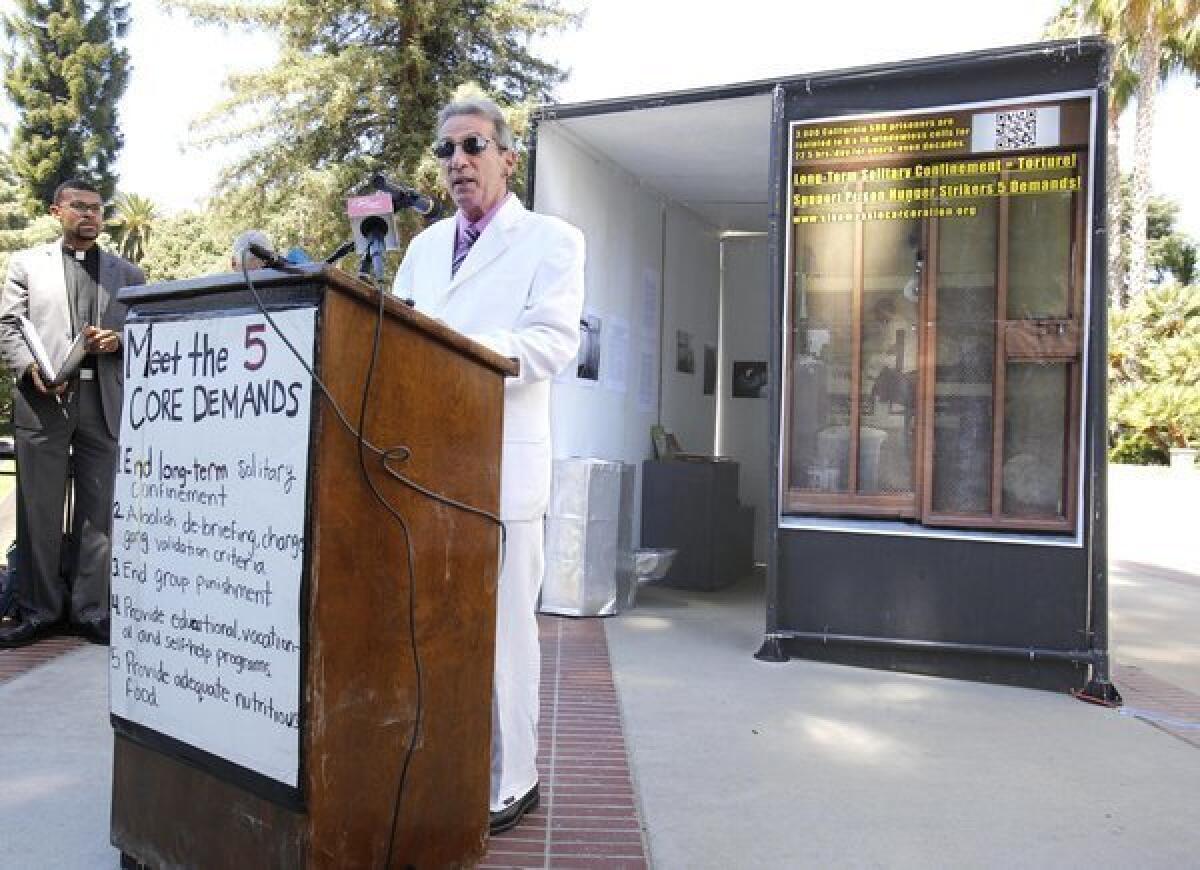Tom Hayden on how to end California’s prison hunger strike

- Share via
At least 300 inmates are now several weeks into a fast that could soon lead to organ failure and death for many of them. Events are moving rapidly, but as I write, nothing has been resolved. And, as California corrections chief Jeffrey Beard made clear recently in an Op-Ed for this newspaper, the sides are far apart.
Beard, presumably reflecting Gov. Jerry Brown’s views, paints the strike leaders as dangerous gang leaders who are pressuring inmates into a hunger strike to “restore their ability to terrorize fellow prisoners, prison staff and communities throughout California.” That rhetoric is hardly designed to lead to conflict resolution. On their side, the strikers are demanding an immediate end to what they see as inhumane conditions, including indefinite solitary confinement, which they see as a violation of the 8th Amendment ban on cruel and unusual punishment.
Neither side is going to change its basic position. But even if some of the biggest issues can’t be resolved, there is nevertheless an honorable way to end the California prison hunger strike before any of the strikers die.
The first thing that’s needed to prevent a tragedy is an immediate shift from the heated rhetoric to conflict-resolution measures. The governor’s negotiators have demanded that the hunger strikers end their fast before any issues can be resolved. Whatever its philosophical merits, that demand is likely to cost lives. The courts have already ruled that California prisons don’t meet constitutionally guaranteed standards. Does the governor really want a legacy of inmates starving to death on his watch?
To prevent deaths, both sides will have to put their philosophical differences on hold and focus on key measures that would bring relief from the worst agonies of solitary confinement, even if the state is unwilling to end it completely.
The strikers, for their part, must accept that some of their “core demands,” including the call for a far more humane approach to incarceration in the state’s Special Housing Units, are nonstarters with the Brown administration. The governor, for his part, should immediately ask his representatives to begin delivering on the strikers so-called supplemental demands. These include such measures as fixes to prison air conditioning systems, fresher food and the right to a weekly phone call. The strikers have also called for reopening the Pelican Bay visitors’ center and allowing visits of four to six hours on weekends and holidays for family members, who often must travel hundreds of miles to Pelican Bay. And they want the right to take one photograph per year, to purchase more art supplies from the canteen, to sell or give away artwork and to have more access to educational courses and current books.
Many of these supplemental demands should have been granted long ago because they are the right thing to do. Even some Brown administration officials privately acknowledge that many of the demands are reasonable. But the administration has refused to take any action as long as the hunger strikes continue. The prisoners, for their part, feel that if they end their action without any concessions from corrections officials, the pressure will be off, retribution will be taken and the status quo will resume.
There is an urgent need to put aside the toxic resentments and suspicions that date to California’s prison wars of decades past. Both sides need to focus on what is possible right now, and turn their immediate attention to preventing unnecessary deaths in the present stalemate. After that, the sides — with court intervention if necessary — can continue to deliberate on further reforms.
Tom Hayden, a former state senator, is the author of “Street Wars” and is a longtime advocate of prison reform.
More to Read
A cure for the common opinion
Get thought-provoking perspectives with our weekly newsletter.
You may occasionally receive promotional content from the Los Angeles Times.









